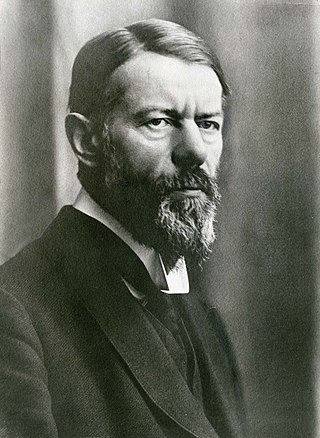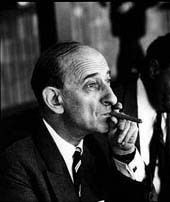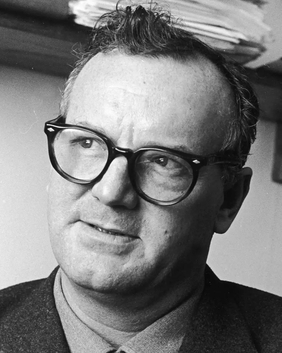There are varying interpretations of Max Weber's liberalism due to his well-known sociological achievements. Max Weber is considered an eminent founder of modern social sciences, rivaled by the figures of Émile Durkheim and Karl Marx. Some students of Weberian thought have paid less attention to Weber's extensive and often passionate engagement with the politics of his day, particularly in the United States. However, European intellectuals have given more attention to his political thought. Most of Weber's political writings have not been published in translation, or have been translated only recently in a piecemeal form.
Weber's political ideas have inspired disagreement in Germany for decades. His conception of democracy has been the subject of particularly heated debate. Weber rejected the Wilhelmine regime's authoritarian political structure. [1] He advocated parliamentary and democratic reform. [1] Weber championed the freedoms of what he called the "age of the Rights of Man". [2] Some find the liberalism of Weber as problematic. [3] [4] [5] [6]
Raymond Aron has noted that Weber was not a "liberal in the American sense," and not, "strictly speaking, a democrat in the sense that the French, the English, or the Americans gave the term." [3] Aron saw Weber to have looked to place the "glory of the nation and the power of the state" above all other things. [3]
Stephen P. Turner and Regis A. Factor have concluded that Weber rejected the philosophical basis for most Western formulations of Enlightenment liberalism. [4] [7] Weber conceived "parliamentarization" primarily for selecting leaders. [8] [9]
JP Mayer wrote a 1944 critique of Max Weber entitled Max Weber and German Politics: a study in political sociology. Published in England during the war, the work has never appeared in German translation. [4] [5] Mayer had been an archivist for the Social Democratic Party (SPD) and the primary book reviewer for the Vorwärts , the SPD party paper. He was a target of Nazi persecution from which he escaped to England, where he became involved with the Labour Party and was a member of the faculty at the London School of Economics during the end of the Second World War. [7] Mayer labelled Weber's philosophy as the "new Machiavellianism of the steel age." The conception of the state that Weber supported was viewed as a middle phase in a destructive tradition of German realpolitik, a tradition that Mayer saw to extend from Bismarck to Hitler. [4] [5] Mayer interpreted a "tragic" satisfaction with which Weber was seen to embrace "the empty character" of Heinrich Rickert's neo-Kantian philosophy of value. [5] Mayer viewed Weber's value theory as a nihilistic contribution to the rise of National Socialism.
Wolfgang J. Mommsen initiated debate by arguing that in the 1959 German publication of Max Weber and German Politics 1890–1920. [6] Mommsen questioned the sociologist's liberal reputation. According to Mommsen, Weber's sociological idea of charismatic authority was evident in his political views and was "close to fascist notions of plebiscitary leadership." [10] Mommsen wrote that Weber's theory of democracy "lent itself all too readily to an authoritarian reinterpretation" [10] [11] Mommsen also associated Weber with the rise of Hitler: "Weber's teachings concerning charismatic leadership coupled with the radical formulation of the meaning of democratic institutions, contributed to making the German people inwardly ready to acclaim the leadership position of Adolf Hitler." [4] [6]
Weber's call for the democratic reform of the Wilhelmine state and his involvement in the drafting of the Weimar Constitution, had led German intellectuals in the 1950s to consider him as an authority who could justify the democratic character of the new Federal Republic of Germany. [4] Mommsen's thesis, that Max Weber supported parliamentary democracy as a means to serve the power interests of the German nation-state, met a sharp response because, in Raymond Aron's words, that removed "the new German democracy of a 'founding father,' a glorious ancestor, and a spokesman of genius." [3]
Weber's political views have been considered to threaten the reputation of his sociology. [11] Günther Roth, Reinhard Bendix and Karl Loewenstein have defended Weberian sociology by arguing that it stands separate from his political convictions. [4] [7] [11] [12] [13] They consider Weber's distinction between scientific value neutrality and evaluative politics to support this claim. [4] [7] [11] [12] [13] In their view, Weber's politics should be interpreted as separate from the interpretation of his sociology. This idea was rejected by Mommsen.
Mommsen wrote of continuities between Weber's "value-neutral" sociology and his "evaluative" politics. The second edition of Max Weber and German Politics 1890-1920 argued that "values and science, in Weber's thought, were interdependent." Critics were dismissed as attempting "to shield Max Weber's sociological works against any possible criticism based on political aspects." [4] Roth responded in a 1965 American sociological journal, stating that Weber was a major target for a series of critiques aimed at political sociology in general, if not at most of social science. [11] Roth also stated that Mommsen was removed from the interest of American sociologists in Weber and that Mommsen's treatment becomes questionable when he interprets Weber's sociological analysis as political ideology. [11] Roth stated that his "major intent" was "not to provide an historical defense of Weber but a review of critiques as they seem to bear on the raison d'etre of political sociology." [11] Roth further stated that Weber "must appear relativist and Machiavellian to all those who, for ideological reasons, cannot recognize any dividing line between political sociology and political ideology. Weber emphatically insisted on such a distinction, while his critics refuse to distinguish between his scholarship and his politics". [11]
Raymond Aron did not consider Weber's sociology to stand above politics. He viewed Weber, in both politics and sociology, to be a typical "power-politician". [14] Aron wrote in 1971 that Weber "belongs to the posterity of Machiavelli as much as to the contemporaries of Nietzsche" and that "the struggle for power between classes and individuals" seemed to Weber as the "essence" of politics. [14]

Jürgen Habermas is a German philosopher and social theorist in the tradition of critical theory and pragmatism. His work addresses communicative rationality and the public sphere.

Maximilian Karl Emil Weber was a German sociologist, historian, jurist, and political economist who was one of the central figures in the development of sociology and the social sciences more generally. His ideas continue to influence social theory and research.

Karl Mannheim was a Hungarian sociologist and a key figure in classical sociology as well as one of the founders of the sociology of knowledge. Mannheim is best known for his book Ideology and Utopia (1929/1936), in which he distinguishes between partial and total ideologies, the latter representing comprehensive worldviews distinctive to particular social groups, and also between ideologies that provide support for existing social arrangements, and utopias, which look to the future and propose a transformation of society.
Gemeinschaft and Gesellschaft, generally translated as "community and society", are categories which were used by the German sociologist Ferdinand Tönnies in order to categorize social relationships into two types. The Gesellschaft is associated with modern society and rational self-interest, which weakens the traditional bonds of family and local community that typify the Gemeinschaft. Max Weber, a founding figure in sociology, also wrote extensively about the relationship between Gemeinschaft and Gesellschaft. Weber wrote in direct response to Tönnies.

Raymond Claude Ferdinand Aron was a French philosopher, sociologist, political scientist, historian and journalist, one of France's most prominent thinkers of the 20th century.

In political philosophy, a monopoly on violence or monopoly on the legal use of force is the property of a polity that is the only entity in its jurisdiction to legitimately use force, and thus the supreme authority of that area.

Charles Wright Mills was an American sociologist, and a professor of sociology at Columbia University from 1946 until his death in 1962. Mills published widely in both popular and intellectual journals, and is remembered for several books, such as The Power Elite, White Collar: The American Middle Classes, and The Sociological Imagination. Mills was concerned with the responsibilities of intellectuals in post–World War II society, and he advocated public and political engagement over disinterested observation. One of Mills's biographers, Daniel Geary, writes that Mills's writings had a "particularly significant impact on New Left social movements of the 1960s era." It was Mills who popularized the term New Left in the U.S. in a 1960 open letter, "Letter to the New Left".

The German sociologist Max Weber formulated a three-component theory of stratification that defines a status group as a group of people within a society who can be differentiated by non-economic qualities such as honour, prestige, ethnicity, race, and religion. The German terms are Stand and Stände

The three-component theory of stratification, more widely known as Weberian stratification or the three class system, was developed by German sociologist Max Weber with class, status and party as distinct ideal types. Weber developed a multidimensional approach to social stratification that reflects the interplay among wealth, prestige and power.
Wolfgang Justin Mommsen was a German historian. He was the twin brother of historian Hans Mommsen and the great-grandson of Theodor Mommsen.
In sociology, social action, also known as Weberian social action, is an act which takes into account the actions and reactions of individuals. According to Max Weber, "Action is 'social' insofar as its subjective meaning takes account of the behavior of others and is thereby oriented in its course."

The National-Social Association was a political party in the German Empire, founded in 1896 by Friedrich Naumann. It sought to synthesise liberalism, nationalism and non-Marxist socialism with Protestant Christian values in order to cross the ideological front lines and draw workers away from Marxist class struggle. However, it never grew beyond a minor party of intellectuals which failed to gain mass support in elections.
In sociology, the iron cage is a concept introduced by Max Weber to describe the increased rationalization inherent in social life, particularly in Western capitalist societies. The "iron cage" thus traps individuals in systems based purely on teleological efficiency, rational calculation and control. Weber also described the bureaucratization of social order as "the polar night of icy darkness".

Max Weber was a German sociologist. He described himself as a left-wing liberal. An example of his 19th-century liberal views is staunch nationalism based on classical republicanism, and that a nation with freedom for individuals is maintained by the virtues and character of its citizens. He also had a strong belief in the benefits of capitalism. Weber's assertion that capitalism had deep Christian origins was, ultimately, a political defense of the market system. His work stands in sharp contrast to socialists like Werner Sombart or RH Tawney, who argued that capitalism was fundamentally un-Christian.

Phenomenology within sociology, or phenomenological sociology, examines the concept of social reality as a product of intersubjectivity. Phenomenology analyses social reality in order to explain the formation and nature of social institutions. The application of phenomenological ideas in sociology differs from other social science applications of social science applications
The following events related to sociology occurred in the 1960s.
Stephen Park Turner is a researcher in social practice, social and political theory, and the philosophy of the social sciences. He is Graduate Research Professor in the Department of Philosophy of the University of South Florida, where he also holds the title Distinguished University Professor. He has held a NEH Fellowship, was Simon Honorary Professor at Manchester University and has twice been the Advanced Fellow at the Swedish Collegium for Advanced Studies

Colin John Crouch, is an English sociologist and political scientist. He coined the post-democracy concept in 2000 in his book Coping with Post-Democracy. Colin Crouch is currently Emeritus Professor at the University of Warwick and an External Scientific Member of the Max Planck Institute for the Study of Societies.
Guenther Roth was a German-American sociologist. He was recognized as the leading scholar, translator and editor of the work of Max Weber in the English-speaking world; together with Claus Wittich, he translated and edited the first complete version of Weber's classic Economy and Society in English. He was professor emeritus at Columbia University. Later, his research interest extended to the biographical aspects of the sociological classics, in particular the genealogy of Weber's family.
Wolfgang Schluchter is a German sociologist and, as of 2006, professor emeritus at Heidelberg University. Schluchter is recognized as a leading sociologist of religion and an authority on the history of sociological theory, in particular on the work of Max Weber. He was one of the editors of the Max Weber-Gesamtausgabe, alongside Wolfgang J. Mommsen and Johannes Winckelmann. Gangolf Hübinger succeeded Mommsen after he died in 2004. The project was completed in June 2020, with forty-seven volumes. Schluchter was visiting professor at several universities worldwide, including the University of Pittsburgh, The New School for Social Research, and the University of California, Berkeley.